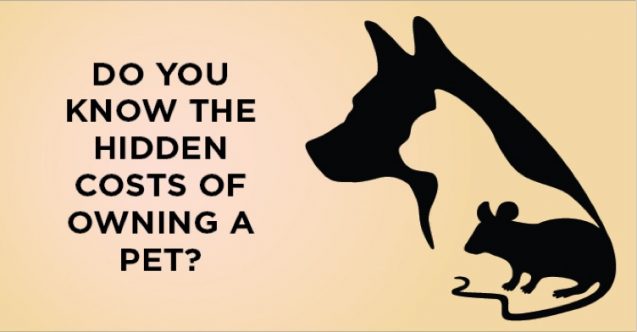The old saying goes, “a dog is a man’s best friend”, but at what cost? We know you’ve been there. You see an adorable dog or cat who looks like they would be the perfect fit for you; imagining how they’ll interact with you and your family. You’re thinking how you will finally reach your daily step count when you take “Fido” on long walks, and how you will no longer need to vacuum, or to “clean” the dishes before putting them into the dishwasher. Oooh, and you can even blame the dog when a strange odor begins to suffocate your spouse. But, before you decide to bring your new furry friend home, make sure you ask yourself, “Can I afford to be a pet owner?” It may be more costly than you think.
The cost of an animal does not stop once you leave the adoption shelter or pet store. Let’s start by taking the advice from David Weliver who provides a breakdown of the average first year cost of pet ownership for one medium dog or one cat.
Annual pet expenses
Food: Dog: $120/ Cat: $145
Annual Medical Exams: Dog: $235 / Cat: $130
Litter: Cat: $200
Toys and Treats: Dog: $55 / Cat: $25
License: Dog: $15
Pet Health Insurance: Dog: $225 / Cat: $175
Miscellaneous: Dog: $45 / Cat: $30
Total Annual Costs: Dog: $695 / Cat: $705
Wow. According to this report, the total first-year cost of owning a dog is $1,270 and for a cat it is $1,070!
Simply put, the average cost of owning a pet is well over $1,000 in the first year, and $500 each additional year. Now let’s talk about expecting the unexpected. Unforeseen costs will creep up on you, and that makes this total significantly higher. And don’t forget, this report does not include other factors such as the quality of food, specific medications, and refills, or (if you travel), pet sitting or boarding. Also, consider if you live in an apartment building—does your landlord allow animals? Will you be expected to pay a nonrefundable pet deposit or cleaning fee? Some apartments even have a pet fee they’ll charge you every month.
We’re not telling you to walk away from those big brown eyes and furry tail; we just want you to know what you’re financially walking into. In that light, the Texas Society of CPAs has a pet budget worksheet to help you estimate pet ownership costs. David Weliver writes: while the page is geared at parents teaching kids the costs involved in pet ownership, the actual worksheet is universal, and could be useful in trying to determine what your actual pet ownership costs might be.
Another resource we recommend is an article by Kiplinger called, The Hidden and Unexpected Costs of Owning a Pet. The authors recommend budgeting for emergency care and investing in pet insurance. “Owners will likely incur at least one $2,000 – $4,000 bill for emergency care at some point during their pet’s lifetime”, says Dr. Louise Murray, vice-president of the ASPCA’s Bergh Memorial Animal Hospital in New York City.
4 tips for soon-to-be pet owners:
What can we learn from this? For one, the cost of owning a pet is unpredictable no matter how much we try and estimate. It is always better to have a safety net for the worst-case scenario like anything in life. You never want to be in a situation where you are choosing between your pet’s life and your rent or mortgage. Here are our 4 best tips that Weliver says will help you decide if you can afford to own a pet:
- Figure out how monthly expenses will affect your budget. Take a look at the pet budget worksheet and align it with your own. See if there are areas in which you could cut back on or eliminate completely. If not, you probably aren’t willing to make the sacrifices necessary to keep a pet happy and healthy.
- Set up an emergency pet fund between $1,000 and $2,000. Don’t just think, “It will never happen to me.” As the Kiplinger article reads, it is almost definite that every pet during its lifetime will have a major vet bill.
- Consider how you will feel if you are faced with a life-threatening vet bill you can’t afford before it happens. Don’t put yourself in this position; it’s not fair to you, nor your future furry friend.
- If you’re worried about not being able to afford big vet bills, consider pet insurance. When you visit your local vet, he or she will likely have a lot of information for you about purchasing the insurance, but you should do your own research. Not all policies are created equal.
Deciding to become a pet owner should not be done without considering all the financial factors. Remember, they are your trusted companion and no matter what shape or size, they rely on you to provide for them. It is simple for all our money intelligence to go out the door when we see those puppy eyes. However, it is important to consider how your routine and budget will change once you bring home that doggie in the window.
Sometimes it’s hard to see how the little decisions in our lives can become big financial commitments. That’s why it’s smart to figure room in your financial strategy for the unexpected expenses, but also those decisions that will bring us joy—but cost us money. We want to help you discover a financial strategy that will offer you just that—growth, liquidity, and legacy.
We invite you to take 2 minutes to sign up for a FREE, extensive eCourse called Infinite 101®. You’ll receive access to video tutorials, articles, and podcasts. It literally costs you nothing to become educated on this ideal financial strategy and start building wealth.
Take advantage of this FREE resource by clicking below.
FAQ
Q: What are some of the hidden costs associated with owning a pet?
A: Hidden costs of pet ownership can include unexpected veterinary bills, grooming expenses, pet insurance premiums, and the cost of pet accessories and toys.
Q: How can pet owners financially prepare for these hidden costs?
A: Pet owners can financially prepare by budgeting for pet-related expenses, considering pet insurance, setting up an emergency fund for unexpected veterinary bills, and researching the potential costs associated with specific breeds or types of pets.
Q: Why is it important for pet owners to be aware of the hidden costs of pet ownership?
A: Being aware of hidden costs helps pet owners make informed decisions about pet ownership, plan their budgets effectively, and provide the best possible care for their pets without financial stress.








